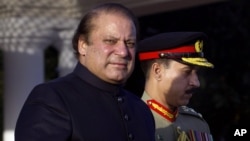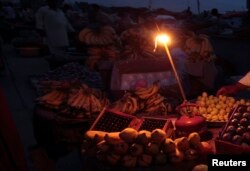ISLAMABAD —
Pakistan’s new Prime Minister Nawaz Sharif has laid out the basic guidelines of his country’s foreign policy, and growing the national economy is at the top of his agenda - an emphasis that may affect Pakistan’s relations with the international community.
Sharif, in his first public foreign policy directive since taking office, has told Pakistan’s diplomatic missions around the world to turn their focus to aiding the economic growth of the nation.
According to Pakistan’s Foreign Affairs Ministry spokesman Aizaz Ahmad Choudhry, Prime Minister Sharif’s priorities for now are internal and economic.
“The prime minister directed our missions abroad to aggressively pursue economic diplomacy [including the] promotion of Pakistan’s interests in the realms of trade, foreign investment, and economic cooperation,” he said.
Pakistan is suffering from a deep economic crisis, with severe energy shortages, inflation and unemployment. Sharif has vowed to resolve the energy problems, which have led some areas to experience power cuts of more than 12 hours a day.
Retired general and analyst Talat Masood welcomed Sharif’s policy direction, saying, “His thrust to improve the energy situation as a first priority is very correct, because truly speaking unless the energy situation in Pakistan improves, there is no hope whatsoever of the economy reviving.”
Sharif’s instructions were thin on tough foreign policy issues, such as relations with the Unites States, Afghanistan and rival India. Former ambassador Maleeha Lodhi said those details will likely emerge over time.
“Here is a prime minister who will focus on the domestic economy. I don’t think he’s going to spend as much time, certainly in the initial phase, on foreign policy except to do what is necessary,” she said.
But, she added, he will not be able to ignore the critical security-related foreign policy issues, such as Afghanistan, for very long.
Persuading Washington to end its controversial drone attacks on militant targets in northwest Pakistan was among Sharif’s top commitments in the lead-up to the May 11 elections. The United States insists the strikes have weakened al-Qaida and Taliban militant networks there.
Islamabad will work to build consensus with Washington, said the spokesman.
“We will build on convergences and wherever there are divergences we will work to try to minimize and remove such divergence,” he added.
Masood said Sharif’s dramatic comeback via the ballot box after being deposed by the army and sent into exile almost 14 years ago has boosted his credibility, and may help him take political risks that other politicians have not been willing to take. But as yet, it is too early to tell if Pakistan’s foreign policy will change dramatically under his five-year tenure.
Sharif, in his first public foreign policy directive since taking office, has told Pakistan’s diplomatic missions around the world to turn their focus to aiding the economic growth of the nation.
According to Pakistan’s Foreign Affairs Ministry spokesman Aizaz Ahmad Choudhry, Prime Minister Sharif’s priorities for now are internal and economic.
“The prime minister directed our missions abroad to aggressively pursue economic diplomacy [including the] promotion of Pakistan’s interests in the realms of trade, foreign investment, and economic cooperation,” he said.
Pakistan is suffering from a deep economic crisis, with severe energy shortages, inflation and unemployment. Sharif has vowed to resolve the energy problems, which have led some areas to experience power cuts of more than 12 hours a day.
Retired general and analyst Talat Masood welcomed Sharif’s policy direction, saying, “His thrust to improve the energy situation as a first priority is very correct, because truly speaking unless the energy situation in Pakistan improves, there is no hope whatsoever of the economy reviving.”
Sharif’s instructions were thin on tough foreign policy issues, such as relations with the Unites States, Afghanistan and rival India. Former ambassador Maleeha Lodhi said those details will likely emerge over time.
“Here is a prime minister who will focus on the domestic economy. I don’t think he’s going to spend as much time, certainly in the initial phase, on foreign policy except to do what is necessary,” she said.
But, she added, he will not be able to ignore the critical security-related foreign policy issues, such as Afghanistan, for very long.
Persuading Washington to end its controversial drone attacks on militant targets in northwest Pakistan was among Sharif’s top commitments in the lead-up to the May 11 elections. The United States insists the strikes have weakened al-Qaida and Taliban militant networks there.
Islamabad will work to build consensus with Washington, said the spokesman.
“We will build on convergences and wherever there are divergences we will work to try to minimize and remove such divergence,” he added.
Masood said Sharif’s dramatic comeback via the ballot box after being deposed by the army and sent into exile almost 14 years ago has boosted his credibility, and may help him take political risks that other politicians have not been willing to take. But as yet, it is too early to tell if Pakistan’s foreign policy will change dramatically under his five-year tenure.












